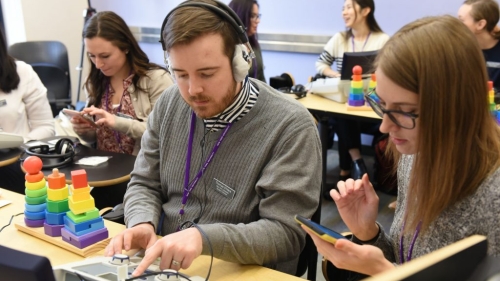Mission
Our mission, within the NYU CSD Justice, Belonging, and Social Change Committee, is to center equity and social change by addressing the unique needs and challenges faced by all members of the department. We are committed to fostering an inclusive and accessible environment that ensures the representation and voices of all constituents—students, faculty, and staff— and social constructions (e.g., race, ethnicity, ability, religion, language, gender, sexuality, citizenship, and others), with a focus on dismantling oppression and creating a disability-inclusive culture within our department and classrooms.
Our core objectives are to:
- Review and Revise Policies: Continuously assess and improve department policies to remove barriers, promote accessibility, and ensure equal opportunities for individuals with minoritized social identities.
- Evaluate Curriculum: Collaborate with faculty to assess and enhance the curriculum, integrating culturally and linguistically responsive and sustaining practices that include diverse learning and communication needs and styles. Our focus is on encouraging critical perspectives, addressing deficit narratives, and promoting a holistic understanding of justice, belonging, and social change.
- Represent Voices: Serve as advocates for the interests and concerns of all constituents—students, faculty, administrators, and staff members —ensuring their perspectives are considered in decision-making processes. We strive to create a platform for open dialogue and constructive change.
- Work Toward Disability-Inclusive Culture: Advocate for equitable processes and inclusive culture within our classrooms as well as within clinical and field experiences.
Through these endeavors, we aim to foster an educational environment where justice, belonging, and social change are not just ideals but lived realities. Our commitment to these principles empowers us to create a community where every student, regardless of background or ability, can thrive and contribute to a more equitable and just society. Together, we work towards a future where the principles of justice, belonging, and social change are at the heart of our educational journey.
This mission statement highlights the committee's dedication to comprehensive change, inclusion, and justice, providing a roadmap for their efforts in reviewing policies, reshaping curriculum, amplifying voices, and fostering disability inclusivity within the academic community.
To share your questions, concerns, and positive feedback, please follow the links below:
- To contact us anonymously, please use the anonymous survey
- To contact us openly, please email us at csd-justice@nyu.edu .

Communicative Sciences and Disorders
665 Broadway, 9th floor
New York, NY 10012
Phone: 212-998-5230
